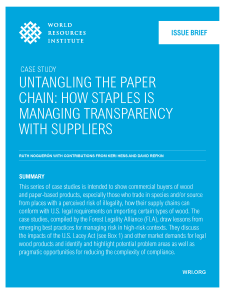Untangling the Paper Chain: How Staples Is Managing Transparency with Suppliers
Staples, Inc., the world’s largest reseller of office products, is in the midst of adapting its sourcing practices to ensure that its products meet not only its own sustainable procurement policy, but the requirements of the U.S. Lacey Act. Under the Lacey Act, it is illegal to trade forest products in the United States if they are of illegal origin, and importers are required to report the make-up and origin of the raw materials used to manufacture the products. Lacey Act violations can result in significant fines and jail time (U.S. Department of Justice, 2012; EIA, 2009).
Staples’ overall strategy to meet both the U.S. Lacey Act requirements and its own Sustainable Paper Procurement Policy is to increase transparency in its supply chains. With the assistance of the Rainforest Alliance’s SmartSource Program, Staples is deploying the tool Smart- Source360 to trace the origin of its products and manage the risk of sourcing unwanted or illegal materials. SmartSource360 is an internet-based supply chain management system designed to compile, analyze, store, and manage supply chain information and documentation directly from suppliers and sub-suppliers.
This issue brief documents the pilot testing of SmartSource360 to trace the supply chains of five private label products that originate from China, the United States, and Brazil, through four suppliers.
